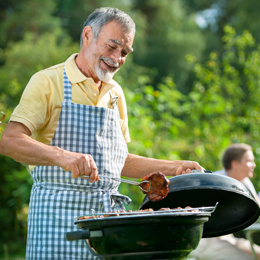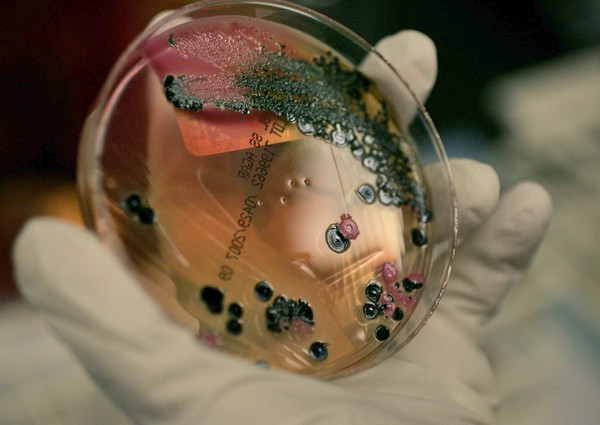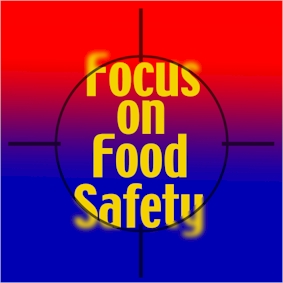 Escherichia coli (E. coli) bacteria normally live in the intestines of people and animals. Most E. coli are harmless and actually are an important part of a healthy human intestinal tract. However, some E. coli are pathogenic, meaning they can cause illness, either diarrhea or illness outside of the intestinal tract. The types of E. coli that can cause diarrhea can be transmitted through contaminated water or food, or through contact with animals or persons.
Escherichia coli (E. coli) bacteria normally live in the intestines of people and animals. Most E. coli are harmless and actually are an important part of a healthy human intestinal tract. However, some E. coli are pathogenic, meaning they can cause illness, either diarrhea or illness outside of the intestinal tract. The types of E. coli that can cause diarrhea can be transmitted through contaminated water or food, or through contact with animals or persons.
Tag: food safety
Food Safety
 Each year, an estimated 76 million Americans get sick from eating contaminated or improperly prepared foods. Many of these people get sick from foods prepared in their home.
Each year, an estimated 76 million Americans get sick from eating contaminated or improperly prepared foods. Many of these people get sick from foods prepared in their home.
Food safety can prevent vomiting and diarrhea caused by food. People can get sick from food that is not properly prepared or stored. For example, when meat and poultry are not fully cooked, bacteria can survive and make us sick. Use a food thermometer to cook meat and poultry to proper temperatures. Separate raw meat, poultry, and seafood and their juices from ready-to-eat foods to prevent the spread of bacteria.
Illness can also occur when food eaten in the home has been contaminated in the field or factory. Wash produce thoroughly under running water. Good hand washing, thorough surface disinfection, safe food handling, and safe food storage can reduce the risk of illness from food.
Health and Safety Tips
- Wash your hands with soap and water before preparing food.
- Wash produce and cutting boards often.
- Use a food thermometer to cook meat and poultry to proper temperatures.
- Wash hands, utensils, and cutting boards after they have been in contact with raw meat or poultry and before they touch another food.
- Refrigerate food within 2 hours of serving.
Follow Safe Grilling Tips
 Grilling and picnicking often go hand-in-hand. And just as with cooking indoors, there are important guidelines that should be followed to ensure that your grilled food reaches the table safely.
Grilling and picnicking often go hand-in-hand. And just as with cooking indoors, there are important guidelines that should be followed to ensure that your grilled food reaches the table safely.
- Marinate safely. Marinate foods in the refrigerator – never on the kitchen counter or outdoors. In addition, if you plan to use some of the marinade as a sauce on the cooked food, reserve a portion separately before adding the raw meat, poultry, or seafood. Don’t reuse marinade.
- Cook immediately after “partial cooking.” If you partially cook food to reduce grilling time, do so immediately before the food goes on the hot grill.
- Cook food thoroughly. When it’s time to cook the food, have your food thermometer ready. Always use it to be sure your food is cooked thoroughly.
- Keep “ready” food hot. Grilled food can be kept hot until served by moving it to the side of the grill rack, just away from the coals. This keeps it hot but prevents overcooking.
- Don’t reuse platters or utensils. Using the same platter or utensils that previously held raw meat, poultry, or seafood allows bacteria from the raw food’s juices to spread to the cooked food. Instead, have a clean platter and utensils ready at grill-side to serve your food.
- Check for foreign objects in food. If you clean your grill using a bristle brush, check to make sure that no detached bristles have made their way into grilled food.
Quick Tips for Preventing Salmonella
 Cook poultry, ground beef, and eggs thoroughly. Do not eat or drink foods containing raw eggs, or raw (unpasteurized) milk.
Cook poultry, ground beef, and eggs thoroughly. Do not eat or drink foods containing raw eggs, or raw (unpasteurized) milk.- If you are served undercooked meat, poultry or eggs in a restaurant, don’t hesitate to send it back to the kitchen for further cooking.
- Wash hands, kitchen work surfaces, and utensils with soap and water immediately after they have been in contact with raw meat or poultry.
- Be particularly careful with foods prepared for infants, the elderly, and the immunocompromised.
- Wash hands with soap after handling reptiles, birds, or baby chicks, and after contact with pet feces.
- Avoid direct or even indirect contact between reptiles (turtles, iguanas, other lizards, snakes) and infants or immunocompromised persons.
- Don’t work with raw poultry or meat, and an infant (e.g., feed, change diaper) at the same time.
- Mother’s milk is the safest food for young infants. Breastfeeding prevents salmonellosis and many other health problems.
Injuries from Ingestion of Wire Bristles from Grill-Cleaning Brushes
Foreign object ingestion is a common reason for visiting an emergency department (ED), particularly for children (1–3). In recent years, internal injuries have been reported following unintentional ingestions of wire grill-cleaning brush bristles by both children and adults (4–6). A series of six cases from a single hospital system with two EDs during July 2009–November 2010 was reported previously (4). This report describes a series of six more cases identified at the same hospital system during March 2011–June 2012. The six patients ranged in age from 31 to 64 years; five were men. Like the patients in the previous series (4), all six reported outdoor residential food grilling and use of commercially available wire grill-cleaning brushes. The severity of injury ranged from puncture of the soft tissues of the neck, causing severe pain on swallowing, to perforation of the gastrointestinal tract requiring emergent surgery. Awareness of this potential injury among health-care professionals is critical to facilitate timely diagnosis and treatment. Additionally, awareness among the public, manufacturers who make wire grill-cleaning brushes, and retailers who sell these products can reduce exposures and decrease the likelihood of further occurrences. Before cooking, persons should examine the grill surface carefully for the presence of bristles that might have dislodged from the grill brush and could embed in cooked food. Alternative residential grill-cleaning methods or products might be considered.
Foodborne Disease Outbreaks Are Deadly Serious
You can keep you and your family safer by remembering to:
- Clean. Wash hands, cutting boards, utensils, and countertops.
- Separate. Keep raw meat, poultry, and seafood separate from ready-to-eat foods.
- Cook. Use a food thermometer to ensure that foods are cooked to a safe internal temperature: 145°F for whole meats (allowing the meat to rest for 3 minutes before carving or consuming), 160°F for ground meats, and 165°F for all poultry.
- Chill. Keep your refrigerator below 40°F, and refrigerate food that will spoil.
- Report suspected illness from food to your local health department.
- Don’t prepare food for others if you have diarrhea or have been vomiting.
- Be especially careful when preparing food for children, pregnant women, those in poor health, and older adults.


